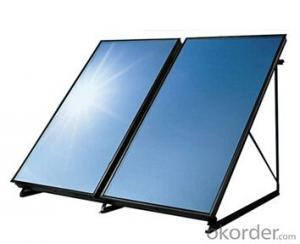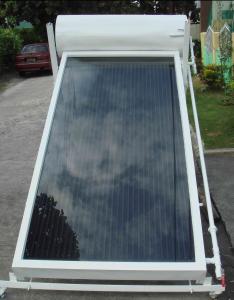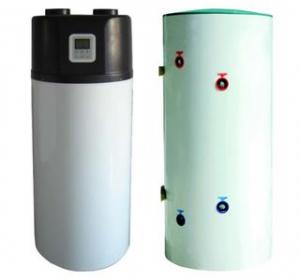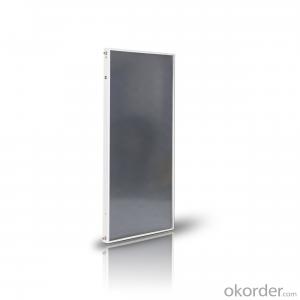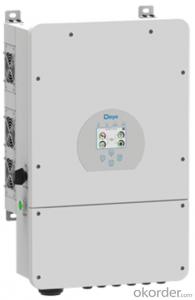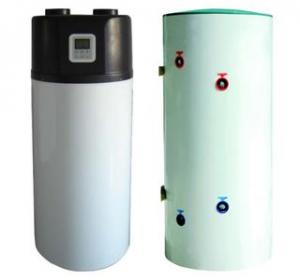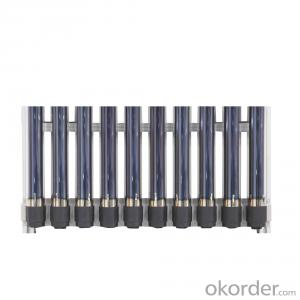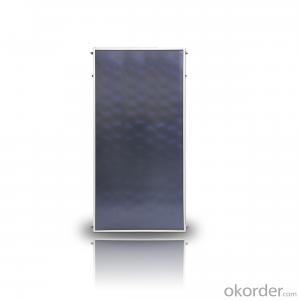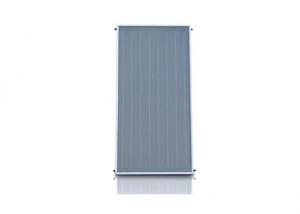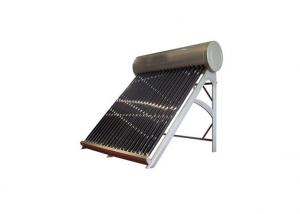Solar Water Heating System High Quality with Aluminum Alloy Frame
- Loading Port:
- China main port
- Payment Terms:
- TT OR LC
- Min Order Qty:
- 10 set
- Supply Capability:
- 10000 set/month
OKorder Service Pledge
OKorder Financial Service
You Might Also Like
Introduction of Non-Pressure Solar Water Heater:
Non-pressure Solar Heater is one of the most economical solar water heating device with pretty high efficiency at the same time. It consists of hot water storage tank, solar vacuum tubes with mouth plug in storage tank, and bracket supporting tank and tubes.When cold water in evacuated tubes is heated with solar irradiation, as the specific gravities of hot water and cold water are different, hotter water goes upward to storage tank and colder water goes downward to glass tubes. through this continuous circulation, the cold water in storage tank will be gradually heated till sunset.
Solar water heaters working principle
1. The solar collector absorbs solar energy and transmits it to the solar water heater tank through circulation
2. When the temperature of the collector reaches the set value, the controller starts the circulation pump automatically
3. The circulation pump makes heat-conducting liquid circulate automatically
4. The heat-conducting liquid transfers heat to water by lower heat exchanger in the water tank.
5. When the temperature difference between solar collector and heat pipe solar water heaters tank doesn't reach the set value, the circulation pump will be shut automatically
6. In case the temperature of the water tank does not reach Tmax, Electric Heating Element will start to work automatically
Solar water heaters working station component:
1. Operating screen
2. Manometer
3. Pump speed adjust switches
4. Temperature difference circulation pump
5. Flow rate indicator
6. Return circuit connector
7. Safety valve
8. Expansion vessel connector9. Return circuit connector
10. Wall mounting
11. Expansion vessel:8L
12. Pressure resistance: 10 bar pressure for expansion vessel
Solar water heaters specification:
Description | solar water heaters |
Material of out manifold | 0.55mm thickness color steel/ fluorine carbon steel |
Material of inner tank | Food grade 2.0 mm thickness SUS304 stainless steel |
Tank insulating layer | 40mm 45kg/m³ high-density polyurethane foamed |
Inlet and outlet hole | Male G1'' |
Max pressure | 0.6 Mpa |
Solar collector tube | 3.3 Borosilicate glass with N/Al coating |
Thickness of glass tube | 1.6mm |
Vacuum tube tightness | P≤0.005 Pa |
Absorption | as=0.93-0.96 (AM1.5) |
Emission ratio | εh=0.04-0.06 (80C±5C) |
Idle sunning property parameters | Y=220~260m2.C/KW |
Average heat loss coefficient | ULT=0.6~0.7W/(m2.C) |
Bracket: | 2.0mm thickness aluminum alloy |
Tank weight | 75KGS |
Tank size | 560mm Dia x 1810mm Height |
Tank capacity | 300L |
Solar collector | 2pcs 58x1800x15tube solar collector |
Absorber area | 2.811 m² |
Working station | SP116 working station |
Heat exchanger length | Upper:12m, Underside:18m |
Solar water heaters details show:
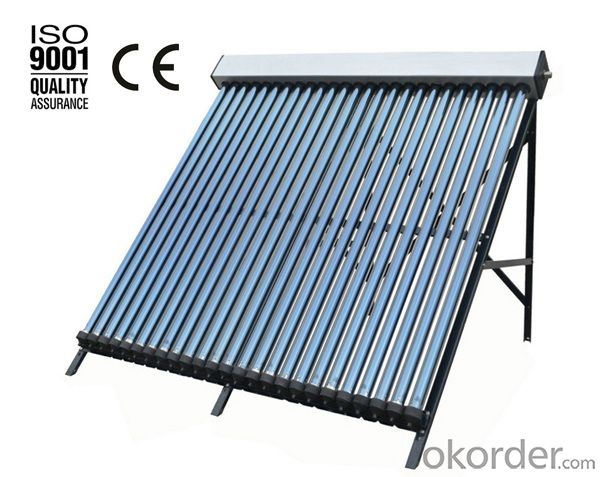
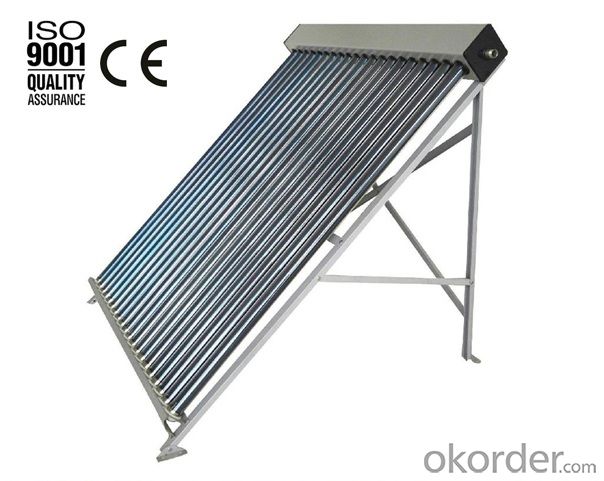
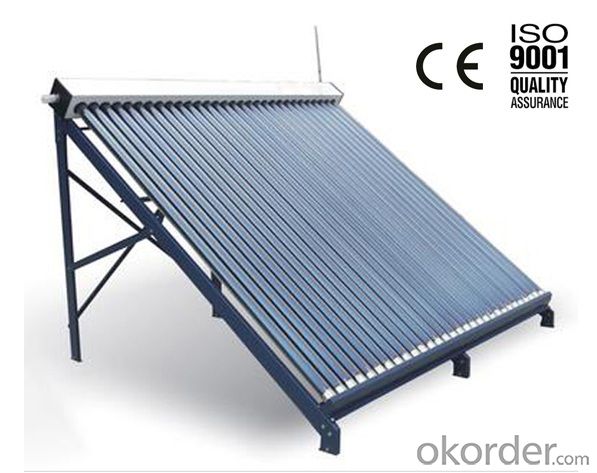
Benefits of this kind of solar water heaters:
1. Prolong the life of your existing water heater
2.Costs less than an electric, gas or oil water heater
3.No maintenance required
4.Lasts longer than a traditional hot water heater
5.Reduce your water heating costs
- Q:Can a solar water heater be used in areas with extreme temperatures?
- Yes, a solar water heater can be used in areas with extreme temperatures. However, the performance of the system may vary depending on the specific conditions. In extremely cold climates, additional insulation and anti-freeze measures may be necessary to prevent freezing of the water and damage to the system. In extremely hot climates, the efficiency of the solar water heater may be higher, but proper ventilation and cooling mechanisms may be required to prevent overheating. Overall, with proper design considerations and adaptations, solar water heaters can effectively function in areas with extreme temperatures.
- Q:What is the difference between an active and passive solar water heater?
- The main difference between an active and passive solar water heater is the way in which they circulate the water. An active solar water heater uses a pump or other mechanical device to circulate the water through the system, while a passive solar water heater relies on natural convection to move the water. This means that an active system requires external power to function, whereas a passive system operates without any mechanical components.
- Q:Can a solar water heater be used in areas with limited roof orientation options?
- Yes, a solar water heater can still be used in areas with limited roof orientation options. While the ideal situation for a solar water heater would be to have a roof with optimal south-facing orientation, there are alternative solutions available. For example, if the roof does not face south, the solar panels can be mounted on a ground-based support structure or on a wall to capture sunlight. Additionally, innovative tracking systems can be used to maximize solar exposure even in areas with limited roof orientation options.
- Q:Can a solar water heater be used in areas with limited access to water resources or water scarcity?
- Solar water heaters offer a practical solution for areas facing water scarcity or limited water resources. By harnessing the power of the sun, they efficiently heat water without relying on traditional methods that consume excessive amounts of water. In regions with restricted access to water resources, solar water heaters present an environmentally friendly and effective way to heat water. They operate primarily using sunlight, eliminating the need for a continuous water supply. This feature contributes to water conservation, making them particularly valuable in areas grappling with water scarcity. Moreover, solar water heaters can be customized with water-saving components like insulation and storage tanks. These features minimize heat loss and reduce the frequency of water refills. This aspect proves advantageous in places where water scarcity is a pressing concern, enabling the optimal utilization of available water resources. It is important to note that while installing and operating solar water heaters may necessitate some water, especially during initial setup and maintenance, the long-term benefits of utilizing solar energy for water heating far outweigh these initial water requirements. All in all, solar water heaters offer a viable solution for regions with limited water resources or experiencing water scarcity. By promoting sustainable and efficient water heating, they alleviate dependence on traditional methods that contribute to water scarcity.
- Q:Are there any maintenance requirements for a solar water heater?
- Yes, solar water heaters do require some maintenance. It is important to regularly inspect and clean the solar panels to ensure they are free from dirt or debris that could hinder their efficiency. Additionally, the system's pumps, valves, and controls should be checked periodically for any signs of malfunction or leaks. Flushing the system annually to remove mineral deposits and checking for any potential leaks in the plumbing connections are also recommended maintenance tasks for a solar water heater.
- Q:Are there any safety concerns with using a solar water heater?
- Yes, there are a few safety concerns associated with using a solar water heater. Some potential risks include overheating, freezing in cold climates, and the possibility of a leak in the system. However, these concerns can be mitigated through proper installation, regular maintenance, and following manufacturer's guidelines.
- Q:Are there any financial incentives for selling excess solar-heated water back to the grid?
- Financial incentives are available for selling excess solar-heated water back to the grid. Numerous countries and regions have net metering programs that enable homeowners and businesses with solar water heating systems to earn credits or payments for the surplus energy they produce and supply to the grid. A bi-directional meter measures the surplus energy, tracking the electricity generated and exported to the grid. These credits can be used to offset future energy consumption or sold back to the utility company at a predetermined rate. Furthermore, certain governments offer feed-in tariffs (FITs) or feed-in premiums, guaranteeing a fixed payment for each kilowatt-hour of solar energy generated and fed back to the grid. These financial incentives not only offset the initial investment in solar water heating systems but also promote the adoption of renewable energy sources and contribute to overall sustainability goals. It is essential to consult local utility companies, government agencies, or renewable energy associations for specific details and eligibility criteria regarding the financial incentives for selling excess solar-heated water back to the grid.
- Q:How much energy can a solar water heater save compared to traditional water heating methods?
- A solar water heater can save a significant amount of energy compared to traditional water heating methods. On average, it can save up to 80% of the energy consumed for heating water, resulting in substantial cost savings and reduced greenhouse gas emissions.
- Q:Can a solar water heater be used in areas with limited access to environmental regulations?
- Yes, a solar water heater can be used in areas with limited access to environmental regulations. Solar water heaters are environmentally friendly and do not emit any harmful pollutants. They rely on clean and renewable energy from the sun to heat water, reducing the reliance on fossil fuels. Therefore, even in areas with limited environmental regulations, solar water heaters can be an effective and sustainable solution for heating water.
- Q:Can a solar water heater be used in areas with limited access to skilled workforce or trained technicians for installation or maintenance?
- Yes, a solar water heater can be used in areas with limited access to skilled workforce or trained technicians for installation or maintenance. Solar water heaters are designed to be relatively simple systems that can be installed and maintained by individuals with basic technical skills. They often come with detailed installation and maintenance manuals that provide step-by-step instructions for the process. Additionally, many solar water heater manufacturers offer training programs and resources that can help individuals in these areas learn the necessary skills for installation and maintenance. These resources may include online tutorials, video guides, or even on-site training sessions. By providing accessible and user-friendly resources, manufacturers aim to empower individuals in areas with limited access to skilled labor to install and maintain solar water heaters themselves. Furthermore, solar water heaters are generally designed to be durable and require minimal maintenance. They are built with high-quality materials and components that can withstand various weather conditions and last for many years with minimal maintenance. This reduces the need for frequent technical interventions, making them suitable for areas where skilled workforce or trained technicians may be scarce. Overall, while having access to skilled workforce or trained technicians can be beneficial, it is possible to install and maintain a solar water heater in areas with limited access to such resources. With proper guidance, training, and durable design, individuals in these areas can successfully utilize solar water heaters to meet their hot water needs.
1. Manufacturer Overview |
|
|---|---|
| Location | |
| Year Established | |
| Annual Output Value | |
| Main Markets | |
| Company Certifications | |
2. Manufacturer Certificates |
|
|---|---|
| a) Certification Name | |
| Range | |
| Reference | |
| Validity Period | |
3. Manufacturer Capability |
|
|---|---|
| a)Trade Capacity | |
| Nearest Port | |
| Export Percentage | |
| No.of Employees in Trade Department | |
| Language Spoken: | |
| b)Factory Information | |
| Factory Size: | |
| No. of Production Lines | |
| Contract Manufacturing | |
| Product Price Range | |
Send your message to us
Solar Water Heating System High Quality with Aluminum Alloy Frame
- Loading Port:
- China main port
- Payment Terms:
- TT OR LC
- Min Order Qty:
- 10 set
- Supply Capability:
- 10000 set/month
OKorder Service Pledge
OKorder Financial Service
Similar products
New products
Hot products
Hot Searches
Related keywords
